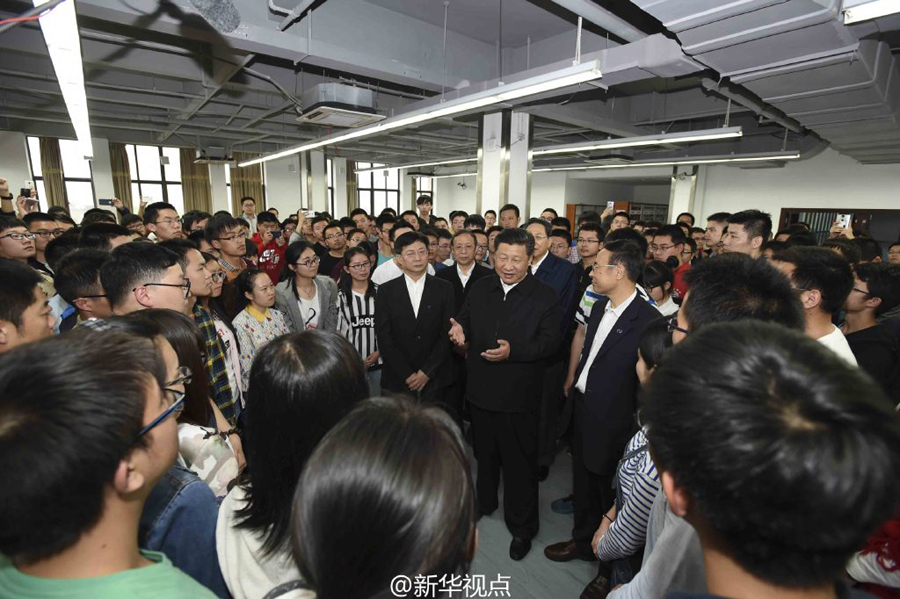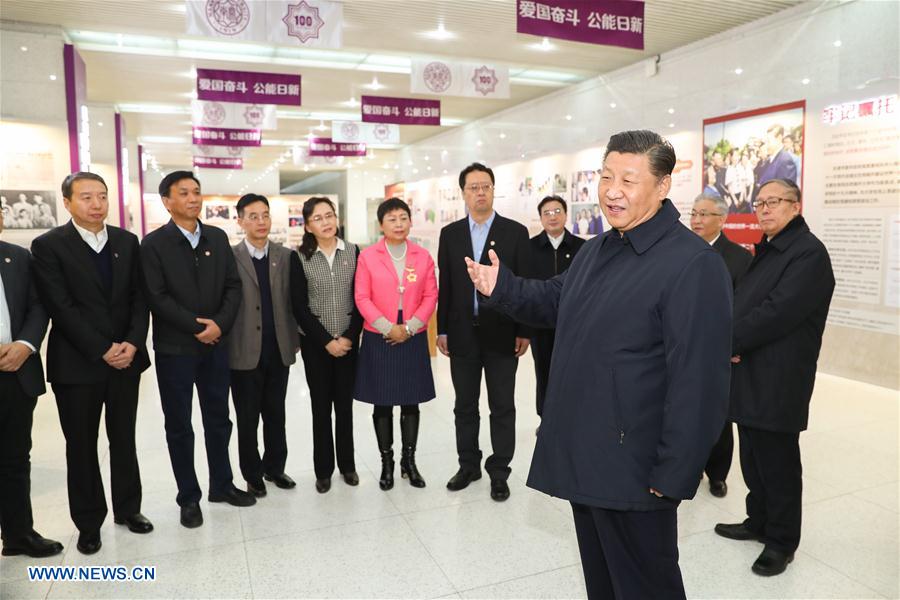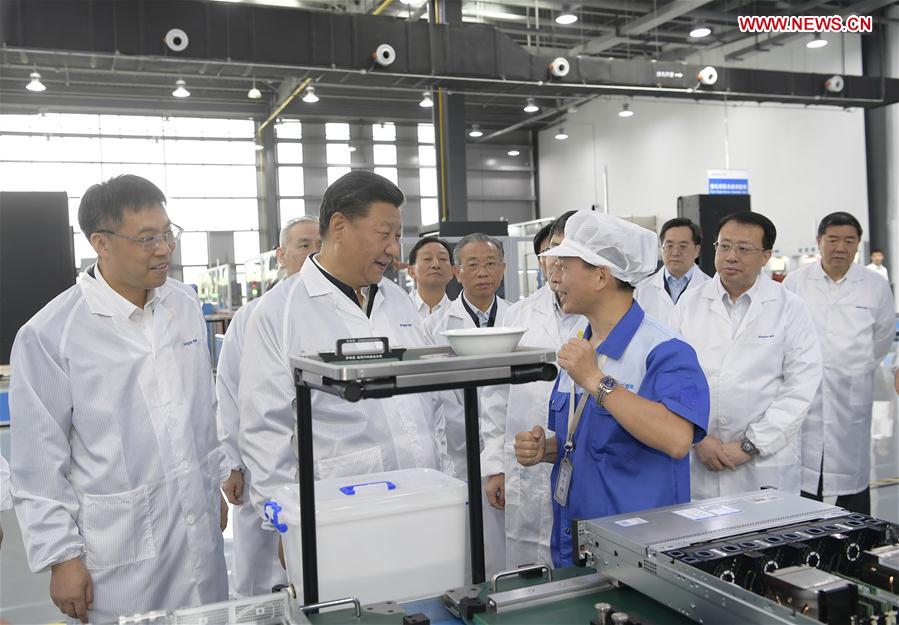Chinese President Xi Jinping has repeatedly emphasized scientific and technological innovation.
Throughout the implementation of the 13th Five-Year Plan (2016–2020), Xi laid out the direction for scientific and technological development by putting forward a series of new ideas, assessments and requirements related to implementing an innovation-driven development strategy and accelerating comprehensive technological innovation.
It is said great scientific and technological innovation achievements have taken place in China over the last five years, with the contribution of science and technology to economic growth rising from 55.3 to 59.5 percent.
China reportedly ranks 14th in terms of innovative ability among 131 economies in the world.
“Key and core technologies”
Since 2016, Xi has visited places full of innovation, repeatedly emphasizing the importance of “key and core technologies” and advocating the struggle to realize self-dependence of “key and core technologies.”
Xi has stressed that key and core technology cannot be borrowed or bought from others. Only by mastering key and core technologies with our own hands can we truly seize the initiative in competition and development, and fundamentally safeguard our national economic security, national security, and security in other areas.
On January 4, 2016, Xi went to Chongqing BOE Optoelectronics Technology Company for an inspection.
Young researchers introduced the processes and results of their technological innovation at the research and development center. At the production workshop, robots lifted cicada-wing-thin glass substrate and placed it at the starting point of the production line. Then the high-speed machinery performed nearly 100 procedures to make the substrate ready for use as mobile phone, television and computer screens.
"President Xi's emphasis on core technologies impressed me a lot," said Gao Wenbao, CEO of the BOE liquid crystal display (LCD) business group.
BOE has studied the key technology of semiconductor display to become a leading LCD company.
"Core technologies with independent intellectual property rights are vital for a company's development," Xi said.
On April 26, 2018, Xi went to FiberHome Technologies Group in Wuhan East Lake High-Tech Development Zone to inspect its innovation and development conditions.
"Core technologies and major scientific instruments must be in our own hands. Research and development cannot rely on work by anybody else but ourselves," Xi said.
Lu Guoqing, former chairman of FiberHome Technologies Group and now general manager of China Information Communication Technologies Group (CICTG), said he has been inspired by Xi's words.
To build a world-class technological innovation platform in information and communication, CICTG was set up by recombining FiberHome Technologies Group and Datang Telecom Technology & Industry Group.
Shortly after its establishment in February 2019, CICTG realized the capability of simultaneous communication of 15 billion people on one optical fiber on the basis of a self-developed 19-core optical fiber.
In the last five years, the fiber has broken records for optical communication many times and its capacity has doubled since 2018.
Independent innovation
"Basic research is the source of the whole scientific system," Xi said. He has emphasized this point many times.
Xi proposed that scientists aim at the frontier of world science and technological development while laying a solid basis for future research.
He encouraged scientists to work wholeheartedly to realize major breakthroughs in forward-looking basic research and leading original results to build China into a science and technology giant.
On April 26, 2016, Xi went to the University of Science and Technology of China (USTC) in Hefei, East China’s Anhui Province, for an inspection.

Xi visits the Institute of Advanced Technology in University of Science and Technology of China in Hefei, East China's Anhui Province, on April 26, 2016, where he was introduced to different innovative technologies.
"The arrival of President Xi greatly inspired all the teachers and students in the laboratory to work hard," said Du Jiangfeng, an academician at the Chinese Academy of Sciences (CAS) in Beijing and director of its Spin Magnetic Resonance Laboratory in Hefei.
During the past four years, the laboratory team has achieved many reported firsts in the cutting-edge world of science and technological development.
The laboratory's cell imaging technology, used for early cancer diagnosis, is reportedly world-leading.
USTC research groups have made successive breakthroughs in quantum research.
In 2016, Micius, the first quantum satellite in the world, was launched.
The Jing-Hu (Beijing-Shanghai) Trunk Line, the world’s first long-distance quantum communication network, opened in 2017.
In 2019, a 24-bit high-performance superconducting quantum processor realized high-dimensional quantum teleportation for the first time.
Inspecting Nankai University in Tianjin on January 17, 2019, Xi said, "We should accelerate constructing first-class universities and first-class disciplines, strengthen basic research, strive for achieving more results in original innovation and independent innovation and reach the peak of world science and technology."

Xi talks to academicians, specialists and teachers at Nankai University in Tianjin, North China, January 17, 2019.
CAS academician and Nankai professor Zhou Qilin said, "We were deeply encouraged by President Xi's words."
Zhou has led his group to accomplish a major original research result: a chiral catalyst which received the first-class State Natural Science Award, the top scientific award of its kind in China, on January 10 this year.
Zhou is now researching green synthetic materials.
Xi visited Jinan Innovation Zone in the East China city on the morning of June 14, 2018, to inspect the high-end fault-tolerant computer production base of Inspur Group.

Xi visits a high-end fault tolerant computer production base of the Inspur Group in the high-tech zone of Jinan, capital of East China's Shandong Province, June 14, 2018.
Xi said innovation should be the basis of development and we should make good use of the advantages of socialism that can concentrate resources on large undertakings to cultivate companies with innovative advantages and promote leading development that relies more on innovation and exerts more of a first-mover advantage.
Inspur Group Chairman Sun Pishu said that President Xi's major assessment about independent innovation strengthened the company’s resolution to make a breakthrough in key and core technology.
Inspur Group is China's leading cloud computing and big data service provider.
(Original story from People's Daily; Translated by Lyv Fu and edited by Zhang Jian)


